No ‘I’ in Dr. Alan S. Law: Incoming AAE President a Quintessential Team Player
By Elisabeth Lisican
Incoming President Dr. Alan S. Law’s life is perhaps best articulated in the famous Vince Lombardi quote: “Individual commitment to a group effort – that is what makes a team work, a company work, a society work, a civilization work.”
The Original Team: Family
Just as there’s no “I” in team, Dr. Law recalls the word “we” far more than “me” growing up with six siblings. Dr. Law has a twin brother, along with two other brothers and three sisters.
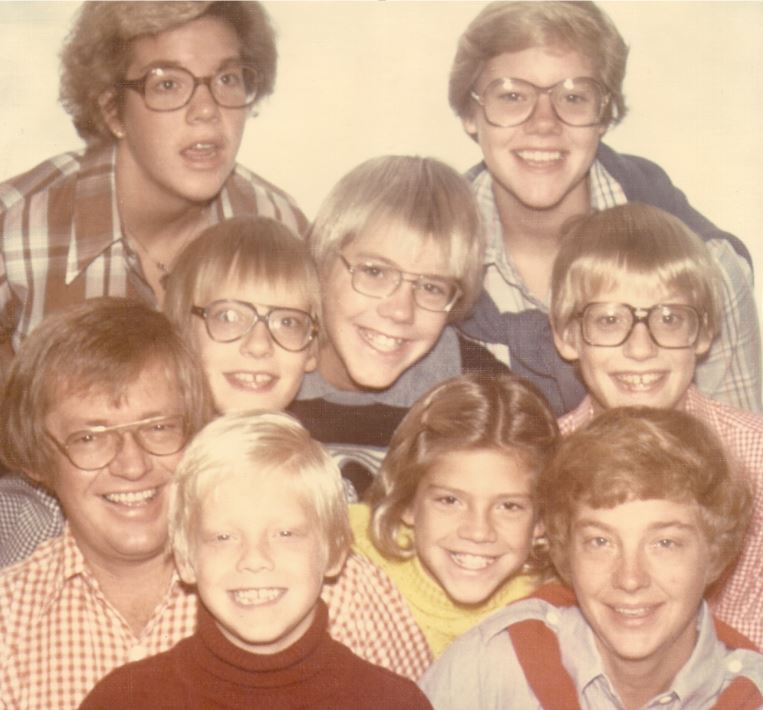
Life was never boring growing up with six siblings! Dr. Law is in the middle row on the left.
“When we started dating, my wife made the comment that no one does anything alone in the Law family,” he said, recalling how any mention of a plan (including going on a date) often meant a few siblings tagging along.
He was born in Iowa and also lived in Illinois, California and Minnesota during his childhood. Each location included time spent around water.
“All of my siblings and I were swimmers, lifeguards, and most of us became swim instructors and swim coaches,” he said. “We learned accountability and the importance of being part of a team.”
His late father worked as a quality control engineer and his mother in various healthcare careers. It was the healthcare careers that truly gripped his interest.
He recalled writing an essay in first grade about his career goals.
“I said I wanted to be a doctor with 10 kids. Only half of that came true. I have always wanted to help people.”
Undoubtedly, growing up in a nurturing household shaped his love of family life.
“We had a lot of love and learned to get by with limited resources,” he recalled. “A lot of activity and minimal TV. Family get-togethers with my siblings have not changed. They still involve games, laughter and music.”
Dr. Law and his siblings were encouraged and required to learn an instrument. He chose piano and cello, and still plays piano on a regular basis. He is pleased that his family shares his love of music.
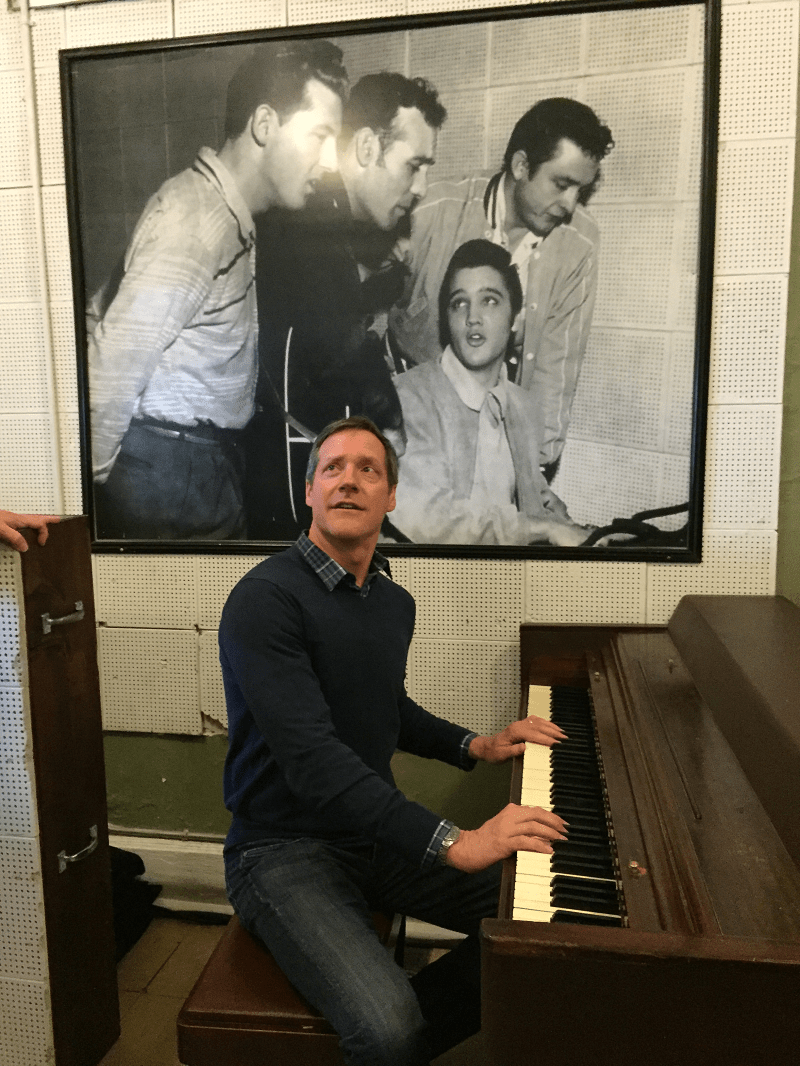
Dr. Law reenacting part of the “Million Dollar Quartet” in Memphis
“My daughter plays the violin and my son plays bass,” he said. “We like to sit around the piano, and we’ll play some jazz and I’ll play some classical music; and my daughter will accompany me. Now she plays more piano duets with me. It’s a great way to spend time and just enjoy each other’s company.”
Just as he stuck to music, he also never lost that initial interest in healthcare. Why dentistry? Not surprisingly, there was a familial reason the field first stood out to him.
“When I was a lifeguard, our family dentist would bring his kids to the pool and I thought, that’s great — he loves his job and he has time with his kids in the evening. I knew I was going to do something in healthcare.”
Dr. Law began his healthcare career studying psychology as an undergraduate at the University of Iowa.
“[Psychology is] valuable in managing anxious patients,” he said. It also led to research opportunities and a dental research scholarship, which helped pay for dental school.
While pursuing his D.D.S. at Iowa, he also found love.
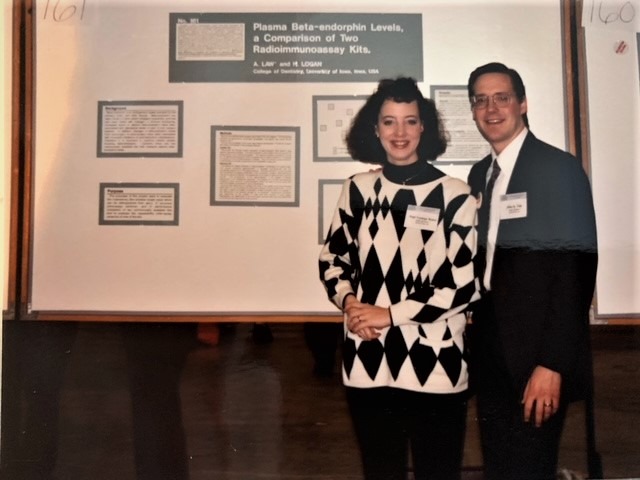
Dr. Law and wife Sandy at an IADR presentation during their honeymoon
“I met Sandy, who was in my dental class. We were married right after dental school, just prior to starting our residencies. As I start my year as president of the AAE, we will have been married 29 years. Sandy has always been supportive of me and has kept everything running smoothly when I have been busy in the practice and involved with academic and professional pursuits. I am so fortunate to have her love and support.”
His decision to specialize in endodontics was another example of meant-to-be and related back to his study of psychology.
When he was in dental school, Dr. Law had a research fellowship and was interested in the relationship between anxiety and pain in dental treatment. He had an interest in the neurobiology of pain, and endodontics married all those areas of interest.
“The endodontic faculty at Iowa, led by Dr. Richard Walton, had high expectations, but balanced the expectations with steadfast support. As residents, we dreaded the disapproving head shake of Dr. Walton, and were encouraged by his smile or nod when he was pleased with us. He and the other faculty brought out the best in the residents.”
“At the end of my residency, Dr. Bill Johnson told my co-residents and me, ‘to those who much is given, much is expected.’ I have never forgotten those words. They have guided me in my personal and professional endeavors, and I am thankful for his mentoring.”
Dr. Law also credits Dr. Gerald Gebhart for being a brilliant and encouraging mentor. “Research in his lab provided the foundation for my clinical research in later years.”
Tooth-Saving Team
Along with a periodontist, Dr. Law formed a Twin Cities multi-specialty practice, The Dental Specialists, in 1998. He became president of the group in 2003, and now practices alongside 30 specialists, over 120 team members, and a talented and dedicated leadership team.
“It has been an honor and joy to work with an amazing group of dental specialists and team members,” he said. “My clinical team, Kathy, Dawn and Krissy make every day in the clinic rewarding and fun. Almost every day I laugh with my team and at least one patient. As endodontists, we have the responsibility and privilege of helping patients who may have high levels of pain and anxiety. Helping these patients is so rewarding and motivating.”
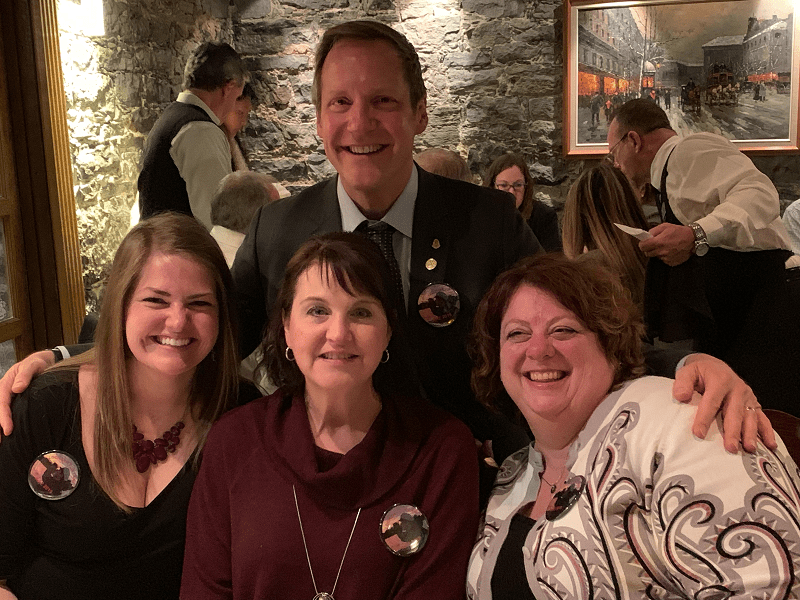
Dr. Law with his clinical team at the AAE meeting in Montreal
In practice, Dr. Law and his team are committed to making patients feel at ease.
“Everyone’s got a story,” he said. “I want to learn something about them, and I want them to know that I have an interest in them. It doesn’t take that much time to find something interesting about a patient. Whether you’re reviewing their health history or asking, ‘how is your day going?’ it’s amazing how many different conversations you can get into in a short period of time. If I can, I’ll even come and greet patients in the reception area.”
He also joins patients at the end of their appointments to talk about something they plan to do after the appointment because “life happens outside of the root canal treatment. I enjoy those conversations.”
Research Team
Indeed, Dr. Law does all he can to understand how endodontists can predict and manage pain. Dr. Law joined the National Dental Practice-Based Research Network — a consortium of participating practices and dental organizations committed to advancing knowledge of dental practice and ways to improve it — in 2009. He became part of a research team, led by Dr. Donald Nixdorf, looking at pain in the first week and at six months following root canal treatment.
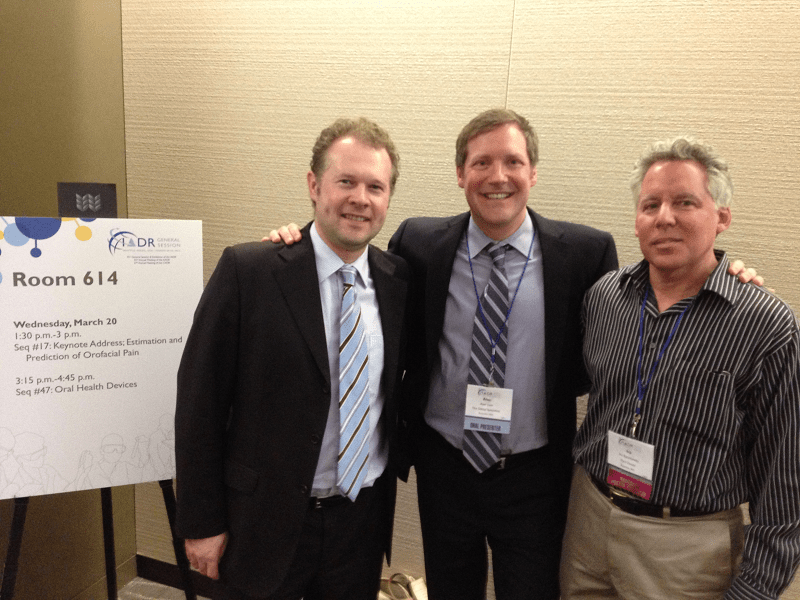
At an IADR lecture with Drs. Donald Nixdorf and Ira Rabinowitz
Based on the results of the team’s preliminary research, they designed a larger scale study on post-treatment pain that followed approximately 1,400 patients up to one year following root canal treatment.
“Our hope is to identify predictors for severe pain in the first week following treatment, and persistent pain at one year following treatment, so that we can better manage post-treatment pain” Dr. Law said. “Working with Don and the NDPBRN has been very rewarding and helped me, and I hope others, gain a better understanding of contributing factors for post-treatment pain. I am hopeful that this will lead to better informed consent and tailored strategies for managing post-treatment pain.”
Dream Team
The ultimate team in Dr. Law’s life these days consists of Sandy and their 20-year-old twins, Gabby and Parker. Just as twins run in Dr. Law’s family, so, too, do well-roundedness, academic aptitude, positive attitudes, and an active lifestyle.
“In the summer, we spend time hiking, swimming and enjoying the outdoors around Minnesota and at our cabin in Michigan’s Upper Peninsula,” he said.
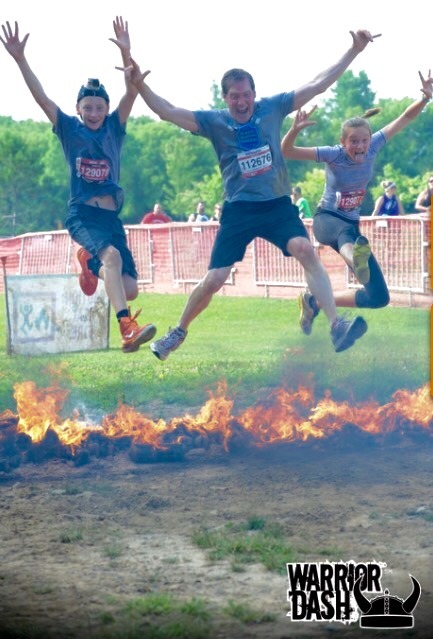
Dr. Law finishing a Warrior Dash with his twins, Parker and Gabby
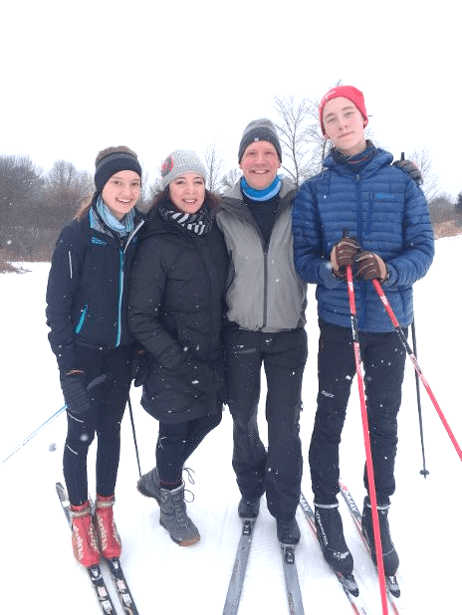
Family Nordic Ski outing
He joins his siblings and children in distance swimming and running events – from 5Ks to marathons to triathlons. And he’s disciplined about his exercise regimen. His family knows he is in bed by 8:30 p.m. so he can be up by 4:30 a.m. to get in a workout before work.
“On occasion, one of them will join me, but not that often,” he said. “Sandy and I love to go to Gabby’s and Parker’s sport events, but even more than that, we love to hang out with them,” he continued. “We are lucky that they still want to hang out with us.”
Dr. Law’s son is a business mind attending Babson College.
“My son, he never has a bad day,” Dr. Law said. “The kid has a great attitude. He’s captain of his college tennis team. And I think he’s a really good motivator. They both still are involved in music and they seem to find meaning in what they do. They enjoy being around people. They respect people.”
His daughter attends Georgetown.
“My daughter is thinking pre-med right now, but she loves so many different areas,” he said.
Dr. Law’s wife Sandy is an orthodontist but feels right at home with endodontists, having attended many an AAE meeting. “I think she knows more endodontists than orthodontists,” Dr. Law said. Outside of her practice, Sandy is a beekeeper and mushroom hunter, and serves on executive committees of nature conservancy organizations. “She has a lot of energy and is passionate about her activities,” commented Dr. Law.
AAE Team
In fact, the AAE has always felt like another family to Dr. Law.
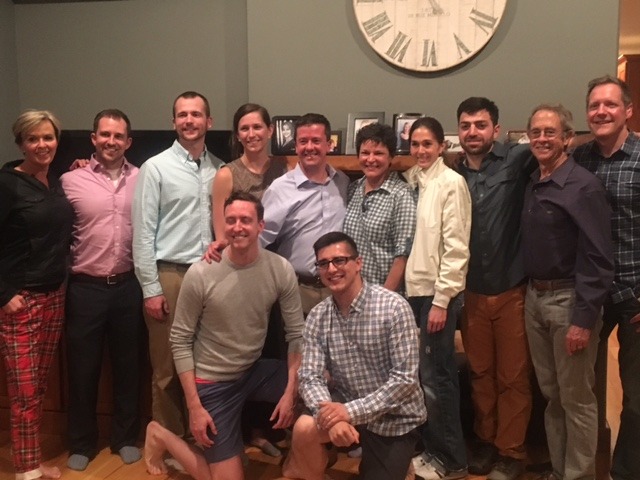
Dr. Law with University of Iowa residents and Drs. Donna Mattscheck, Fabricio Teixeira, Anne Williamson, and Richard Walton in 2017
“In 2003, I had the honor of serving our specialty as a director of the AAE,” he recalled. “I remember walking into my first meeting and being approached by Lou Rossman, Shep Goldstein and Rich Weiss. After they all welcomed me, Lou asked me, ‘Is that how they dress in Minnesota?’ Then critiqued my shirt, pants and shoes. After years of friendly ribbing with my brothers, I knew I was going to fit right in with the other directors.”
His AAE family also helped him through some difficult moments.
“Years later, when my father passed away days before the AAE meeting in Boston, Lou Rossman, Shep Goldstein, and many other past presidents and directors of the AAE came up to me to give me a hug and express their sympathies. I realized that the AAE is more than an association, it is a family of professionals.”
In 2001, Dr. Law became Board certified, and in 2006 he became a director of the ABE.
“I got to work with a multitude of intelligent, hard-working and dedicated endodontists,” he recalled. “One of my biggest honors was giving the oral exam alongside past directors who had been my examiners. It is a remarkable responsibility and honor. I have a tremendous amount of admiration for ABE directors and the important service they provide for our specialty. I encourage everyone to take on the challenge of becoming Board certified. Do it for yourself and do it for our specialty.”
In 2019, Dr. Law became a Trustee of the Foundation for Endodontics.
“For years, I have supported the Foundation and its mission. I do it out of appreciation of our specialty, my instructors, and all of the opportunities I have been afforded because of the service and generosity of those who have gone before me. We are so fortunate to have so many generous donors who have allowed us to improve the lives of others through education, research, and outreach.”
For his Presidential year ahead, he’ll bring forth his team-focused approach.
“I always felt like you can do more as a group than you can individually,” he said.
As professionals, he says, we have very similar goals. “We want to help the patients. And I think it goes beyond that — it’s our team members, it’s our colleagues, it’s our community. And there are many ways to do that, through research and through education and through service outside of our practices — whether it’s Mission of Mercy or Give Kids a Smile.”
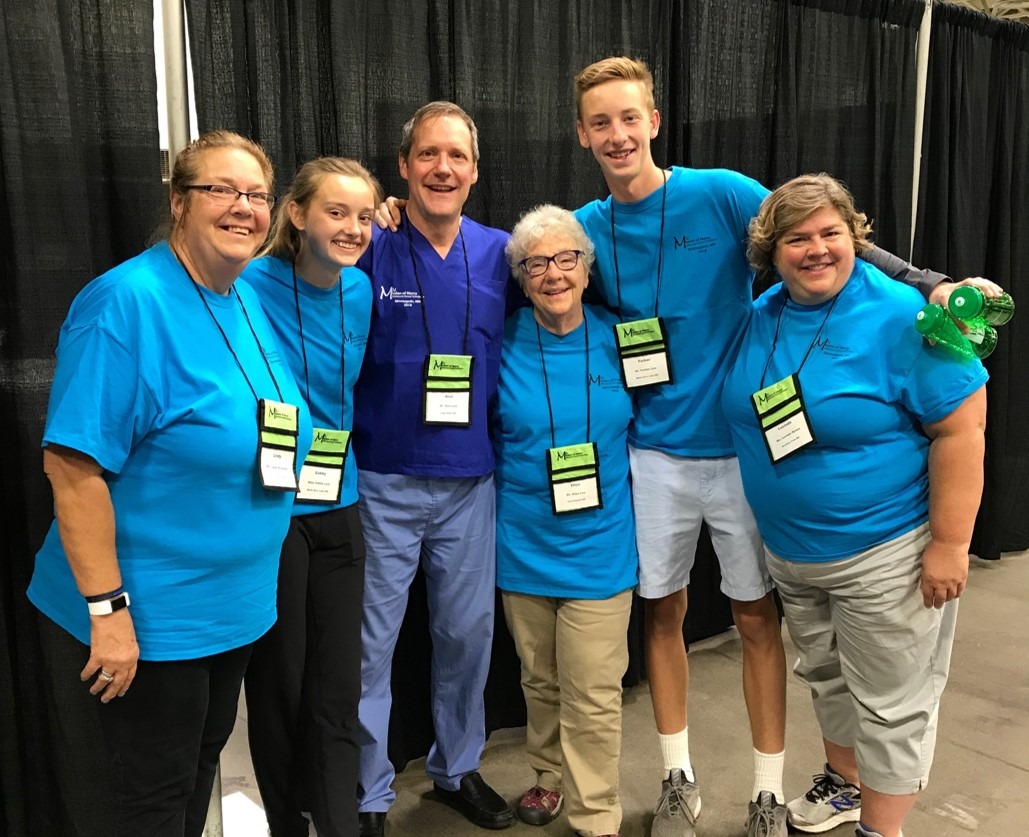
Dr. Law and his children, siblings, and mother, serving with Mission of Mercy
He concluded: “I think it’s important for us to give back collectively and individually so we can make a difference. I want us to focus on what we can do together to improve people’s lives.”




